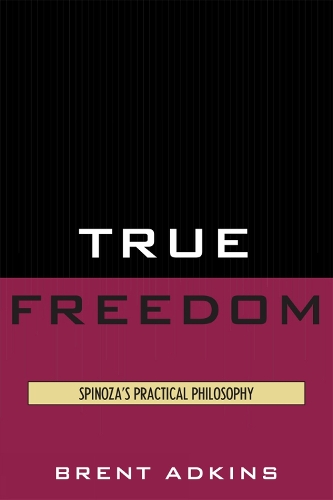
True Freedom: Spinoza's Practical Philosophy
(Paperback)
Publishing Details
True Freedom: Spinoza's Practical Philosophy
By (Author) Brent Adkins
Bloomsbury Publishing PLC
Lexington Books
30th September 2009
United States
Classifications
Professional and Scholarly
Non Fiction
Ethics and moral philosophy
Social and political philosophy
199.492
Physical Properties
Paperback
114
Width 117mm, Height 231mm, Spine 8mm
179g
Description
True Freedom: Spinoza's Practical Philosophy is a straightforward presentation of Spinoza's philosophy focused on the issue of how one might live. The book is unique among recent Spinoza scholarship in the way in which it centers on the ethical component in Spinoza's work. In order to bring Spinoza's ethics to the fore, Brent Adkins begin with what he considers to be Spinoza's fundamental ethical insight: namely, that emotions are controlled by understanding them. Adkins reveals how the process of unfolding Spinoza's philosophy is always anchored in the very practical issue of living well.
The significance of True Freedom lies in its understanding of Spinoza's ethics as an "experimentalism" and its accessibility to a very wide audience. Despite the fact that Spinoza died over 300 years ago, his writings remain remarkably prescient for a wide variety of disciplines, from religion to neuroscience. The source of this prescience, however, comes from Spinoza's recasting ethical theory in terms of how we might live rather than in terms of how we should live. Freedom in every aspect of life from the personal to the political to the religious is dependent on a particular way of engaging with the world. This engagement takes the form of an experiment to see if what we engage with results in an increase or a decrease in our capacity to affect and be affected by the world. True freedom, for Spinoza, lies in increasing our capacities.
Reviews
A real strength of True Freedom is that it does not water down Spinozas views beyond recognition in order to make them accessible. As a Spinoza specialist and a professor, I gleaned some really good ideas from the manuscript about how to present and explain some of Spinozas more difficult ideas without completely losing my students. I could recommend the book to other specialists and teachers of early modern philosophy as a source of helpful pedagogical approaches. -- J. Thomas Cook Cook, Rollins College
Author Bio
Brent Adkins is associate professor of philosophy at Roanoke College.
